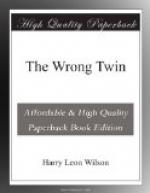Succeeding numbers made it plain that the very republic itself had been founded upon this infamy. Our Revolutionary War had marked the triumph of the capitalistic state—the state that made property sovereign. The Revolutionary fathers had first freed themselves from English creditors, then bound down as their own debtors an increasing mass of the American population. The document known as the Constitution of the United States had been cunningly and knowingly contrived to that end, thus thrusting upon us the commercial oligarchy which persisted to this day. It had placed the moneyed classes securely in the saddle, though with fine phrases that seemed not to mean this.
“A conscious minority of wealthy men and lawyers, guided by the genius of Washington, Franklin, Hamilton, and Madison,” had worked their full design upon the small farmer and the nascent proletariat; we had since been “under the cult and control of wealth.”
After this ringing indictment it surprised no Whipple to read that we had become intolerant, materialistic, unaesthetic. Nor was it any wonder that we were “in no mood to brook religious or social dissension.” With such a Constitution fraudulently foisted upon us by the money-loving fathers of the Revolution, it was presumably not to be expected that we should exhibit the religious tolerance of contemporary Spain or Italy or France.
“Immersed in a life of crass material endeavour,” small wonder that the American had remained in spiritual poverty of the most debasing sort until the New Dawn should come to enrich him, to topple in ruins an exploiting social system.
Now the keen eyes of young America, by aid of the magnifying lens supplied by Emmanuel Schilsky, would detect the land of the free to be in fact a land of greedy and unscrupulous tyrants; the home of the brave a home of economic serfs. Young America, which fights for the sanctity of life, solid and alive with virile beauty, would revolt and destroy the walls of the capitalistic state, sweeping away the foul laws that held private property sacred. They would seek a cure for the falsehood of modern life in a return to Nature, a return to the self where truth ever is. They would war with the privilege and ascendancy of the group over the individual conscience. Already the exploiting class, as it neared the term of its depleted life, was but a mass of purulence. Society was rotten, the state a pious criminal, the old truths tawdry lies. Everywhere the impotence of senility—except in young America. We faced the imminence of a vast breaking-up. The subtlest oligarchy of modern times was about to crumble. The revolution was at hand.
* * * * *
A succeeding number of the New Dawn let out the horrid truth about the war, telling it in simple words that even Wilbur Cowan could understand. Having sold munitions to the warring nations, we must go in to save our money. In short, as the New Dawn put it: “The capitalistic ruling classes tricked the people into war.” It was to be a war waged for greed. Young America, not yet perusing in large enough numbers the New Dawn, was to be sent to its death that capital might survive—the dollar be still enthroned. But the New Dawn was going to see about that. Young America would be told the truth.




